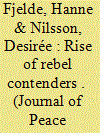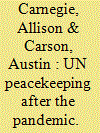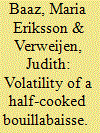| Srl | Item |
| 1 |
ID:
155683


|
|
|
|
|
| Summary/Abstract |
Since the Conseil National pour la Défense de la Démocratie-Forces de Défense de la Démocratie (CNDD-FDD’s) accession to power following the 2005 elections in Burundi, governance setbacks were of great concern and constantly criticized throughout the post-wartime. This study contributes to the understanding of how legacies of wartime shape post-war trajectory of a former rebel movement by analysing the relationship between main post-2005 features of CNDD-FDD and some key elements of its history. There is substantial evidence showing that the CNDD-FDD leadership, lacking political will for real changes, has continued during the post-wartime its armed movement practices from the maquis era, leading to the conclusion of a facade transformation of CNDD-FDD rebel movement-to-political party.
|
|
|
|
|
|
|
|
|
|
|
|
|
|
|
|
| 2 |
ID:
161547


|
|
|
|
|
| Summary/Abstract |
Fragmentation of armed opposition movements through the rise of new rebel groups constitutes a significant challenge to conflict termination and peacebuilding. Yet, the question of why some rebel movements remain cohesive whereas others see a number of contending groups during the course of the armed conflict has received limited attention in existing research. This article addresses this gap by analyzing the determinants of the rise of rebel contenders in intrastate armed conflicts worldwide, 1975–2013. The theoretical framework focuses on barriers to entry, that is, variations in the costs and disadvantages that must be borne by nascent rebel contenders that are not borne to the same extent by incumbent rebel groups. The study proposes that strong social networks underpinning incumbent groups create structural barriers to entry for nascent groups by aggravating challenges of organization building. It further suggests that the interaction between incumbent groups and the government influences strategic barriers to entry as changes in government policies produce windows of opportunity for nascent groups to form. Consistent with these arguments, the study finds that when incumbent groups have strong networks – because rebels either tap into ethnic networks or draw on a leftist ideology – the risk of fragmentation is lower. Furthermore, when the government accommodates groups, through either negotiations or democratic concessions, the risk of fragmentation increases.
|
|
|
|
|
|
|
|
|
|
|
|
|
|
|
|
| 3 |
ID:
178967


|
|
|
|
|
| Summary/Abstract |
Increasing peacekeepers’ access to information derived from intelligence sources could help compensate for their reduced physical presence due to COVID-19.
|
|
|
|
|
|
|
|
|
|
|
|
|
|
|
|
| 4 |
ID:
123503


|
|
|
|
|
| Publication |
2013.
|
| Summary/Abstract |
In early 2012, Congolese army deserters formed the M23 rebel movement. This article analyses the insurgency and other armed group activity in the eastern DRC in the light of the politics of rebel-military integration. It argues that military integration processes have fuelled militarization in three main ways. First, by creating incentive structures promoting army desertion and insurgent violence; second, by fuelling inter- and intra-community conflicts; and third, by the further unmaking of an already unmade army. We argue that this is not merely the product of a 'lack of political will' on behalf of the DRC government, but must be understood in the light of the intricacies of Big Man politics and Kinshasa's weak grip over both the fragmented political-military landscape in the east and its own coercive arm. Demonstrating the link between military integration and militarization, the article concludes that these problems arise from the context and implementation of integration, rather than from the principle of military power sharing itself. It thus highlights the crucial agency of political-military entrepreneurs, as shaped by national-level policies, in the production of 'local violence'.
|
|
|
|
|
|
|
|
|
|
|
|
|
|
|
|